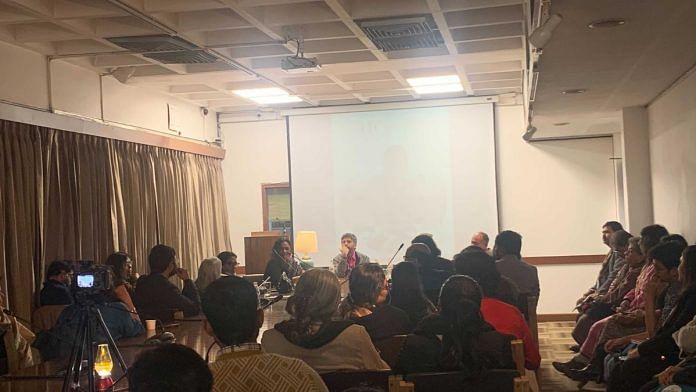New Delhi: Translators aren’t shadowy imitators merely propelling the original work forward. When Tomb of Sand, Daisy Rockwell’s English translation of Geetanjali Shree’s Ret Samadhi, won the 2022 International Booker, the illusion was shattered. The ever-elusive ‘translator’ was brought into the forefront.
During a discussion at New Delhi’s India International Centre, editors and translators Rockwell and Rahul Soni, in conversation with moderators Oroon Das and Sujata Prasad, upended conventional notions of their work. They also raised questions about perfection and the expectations surrounding what constitutes a ‘good’ translation.
The audience was keen and engaged, with a number of people who belonged to the literary world in some shape or form.
“It’s an illusion that we’re not there. We wrote every single word. Whether people want to see us is another matter. The reader would feel like they were reading the original, untainted text,” said Rockwell, who has translated multiple Urdu and Hindi works into English and authored three novels. “The aesthetic has been invisibility.”
While recognition has undoubtedly increased, and translators themselves are less likely to shy away from the spotlight, the issue now lies in the lens through which translations are viewed. Are they supposed to be stainless representations where the translator’s presence shouldn’t be felt? Not necessarily.
The acclaimed Rockwell explained her penchant for leaving “little jokes” in her work. She enjoys experimenting with phrases, particularly those with double meanings. For instance, she was writing while her daughter was tap dancing nearby and a sporting event was being coached. She used the expression “bells and whistles” in her work, both as a literal rendition of her surroundings and a playful addition.
A well-done translation is typically described as seamless. However, sometimes, there is a point in inserting kinks. Transitions aren’t always perfect, nor are they supposed to be. “There are fissures between cultures and languages. There’s racism, colonial violence. That effort [of translating] needs to be shown,” she said.
Also read: Vrindavani Vastra—16th-century Assamese drape reviving sacred weaves. But devouts aren’t happy
Straddling two worlds
Members of the audience pointed out changes they disliked in translated works. Kulfi becomes ice cream, Mozart is ‘Indianised’ as Tan Sen. A question emerged from the audience—should everything be “localised” or should the foreignness of the literary work be allowed to linger? Panelists didn’t give a clear answer. But, translators are permitted to indulge in what Rockwell called playfulness. Additionally, English isn’t necessarily a foreign language in India.
“Translators have to be very, very good writers. You have to invent a whole new language. One that your editors may not necessarily like,” joked Soni, known for translating Shrikant Verma’s Magadh into English.
It’s not just about entering one literary universe—it’s about straddling two. Then there’s the added challenge of being dismissed. Soni, who is also an associate publisher at HarperCollins, laughingly told the audience that when people asked him what he did, he would say that he was a poet.
But the conversation returned to the same conundrum—what are the boundaries of language, and how should they be navigated? It’s a layered question, but was ‘translated’ simply for the audience. How should one describe a gol-gappa? Is it a puffed shell of flour? Or is it just a gol-gappa? This time, however, there was an answer. “People can use Google,” said Rockwell, wryly.
Soni and Rockwell have both translated some magnum opuses of Hindi literature, from Bhisham Sahni’s Tamas to Ashok Vajpeyi’s Har Patte Ka Ek Naam (A Name for Every Leaf). One of Soni’s metrics for deciding whether to take on a particular work is this—“is it a text I can see myself living in?” he asked.



